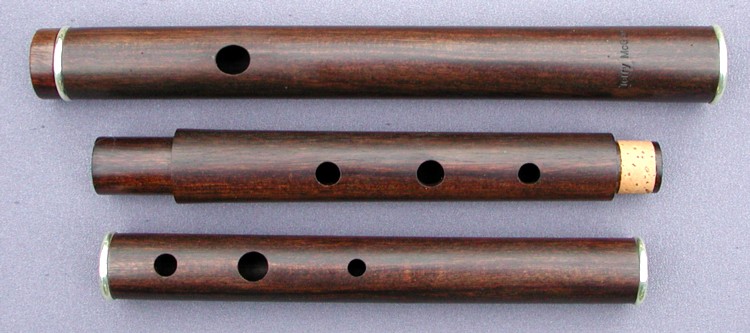Solomon Blackwood- a possible new woodwind timber?Working away quietly in my workshop, and the phone rang. Brian Christie introduced himself, and asked if I'd ever used any Solomon Blackwood in my flute making. I admitted I hadn't. He wondered if I'd like to try some. I said yes, so he sent some down. He also told me a bit about it. The timber's scientific name is "Xanthostemon melanoxylon"- literally "yellow stamens and black wood". It is a member of the family Myrtacea and is commonly called "Solomon Blackwood" or "Queen Ebony". It comes from the Solomon Islands - off the north east end of Australia - where it has been used for boat stern tube bearings, like that more well-known timber, lignum vitae. Its air-dried density is similar to the well-known African Blackwood, Dalbergia melanoxylon, a good starting point for a flute timber. The document referenced above indicates it is protected and so should be safe from the dangers of overharvesting that drove cocuswood to near extinction in the West Indies. Brian's first sample pieces looked encouraging, but had been only roughly dried, so had incurred a few splits which prevented me from doing anything useful with them. He sent some fresher material, which I bored and monitored until its weight stopped going down and started tracking changes in local humidity. Flute-making proceeded without incident and yielded a flute with pleasing appearance and performance.
The finish on the flute above is just plain linseed oil, the colour being natural. We can probably be reasonably confident that this is the first flute ever made from the timber! Now just because a timber makes a good flute doesn't guarantee it is a reliable flute timber. We would need to establish that it doesn't have any hidden vices, like splitting, and that it can be harvested and supplied in the perfect condition that a woodwind maker needs. I'm giving the flute above a good playing at the moment, and will report any problems I find. My experience with Australian timbers, cocus and boxwood is that they require to be waterproofed, and I imagine that Solomon Blackwood will be the same. Two good soakings in linseed oil seems to work for the others, and so that's what I've done with the flute above. The question of harvesting and supply is one for Brian. He'll have to find ways to cut the stuff and get it back to the sawmill without delay, cut it up into the required sizes and package it quickly so that the tropical sun and warm air doesn't dry out the outside too quickly, causing surface checking. Fortunately, I found such degrade easy to spot in the first rough samples, as dark ragged lines in the lighter grey timber. There's nothing too tricky in all of this - just a new discipline that the timber workers will need to get accustomed to. Very hard timbers like this are usually only used in rough applications like railway sleepers and jetty pylons, where surface finish doesn't matter. In our boutique industry, we can't afford any degrade that would mar a perfect finish, or that might provide a starting point for a crack. If you're interested in trying out Solomon Blackwood, I'd suggest you contact: Brian Christie |
AcknowledgementsBrian Christie, for acquainting me with this timber and supplying samples.
|
